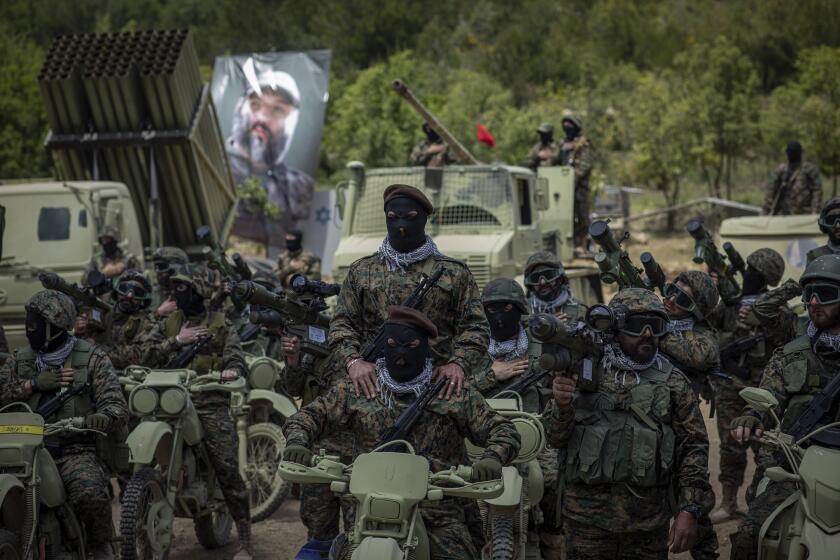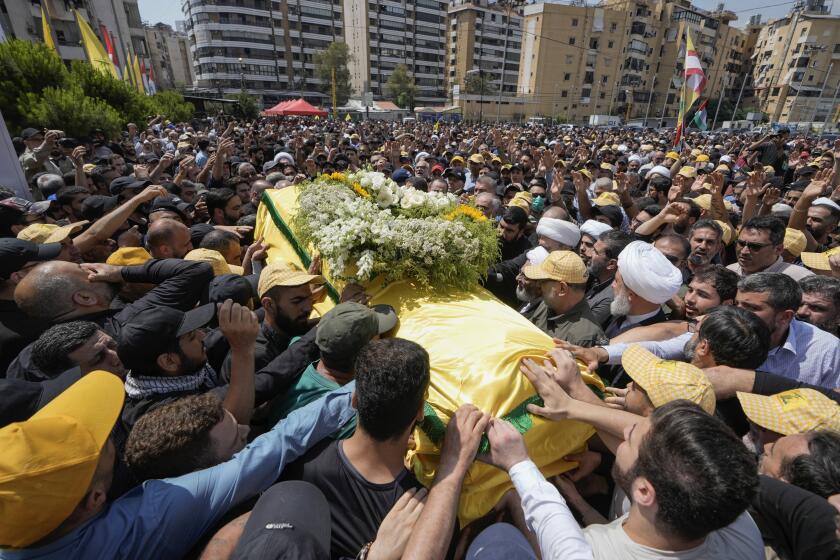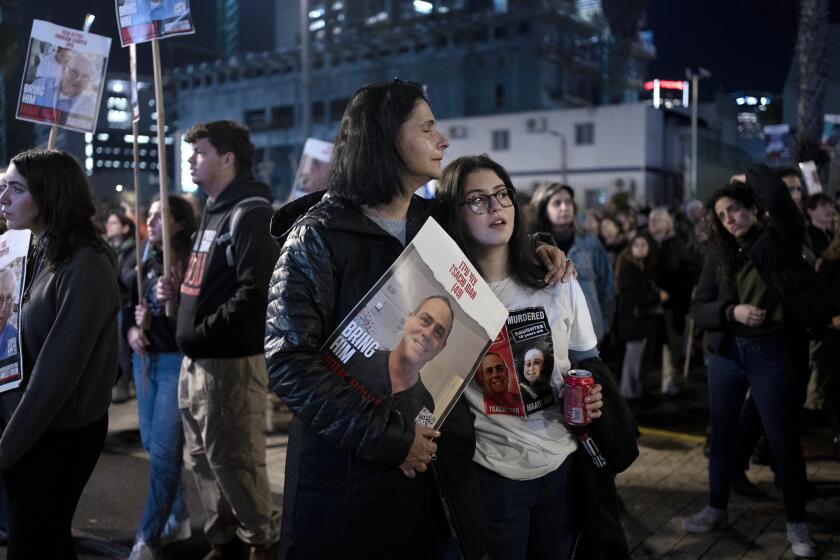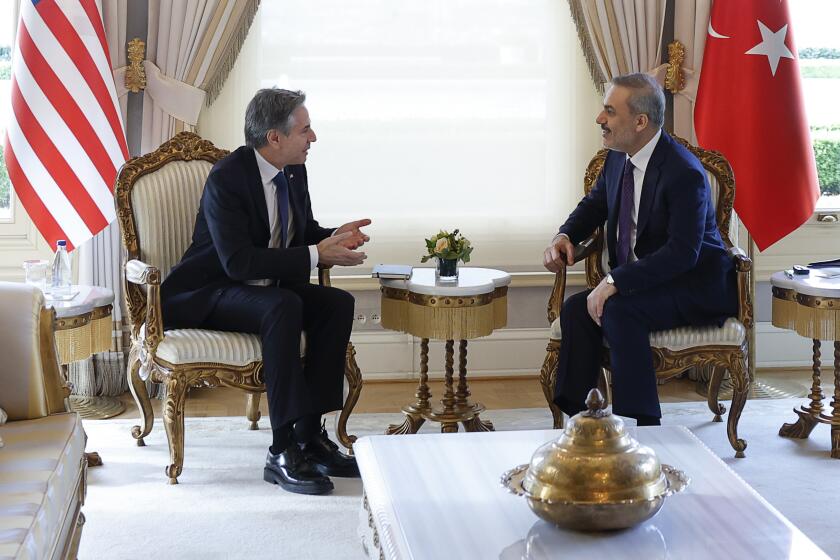The leader of Lebanon’s Hezbollah militant group warns Israel against wider war
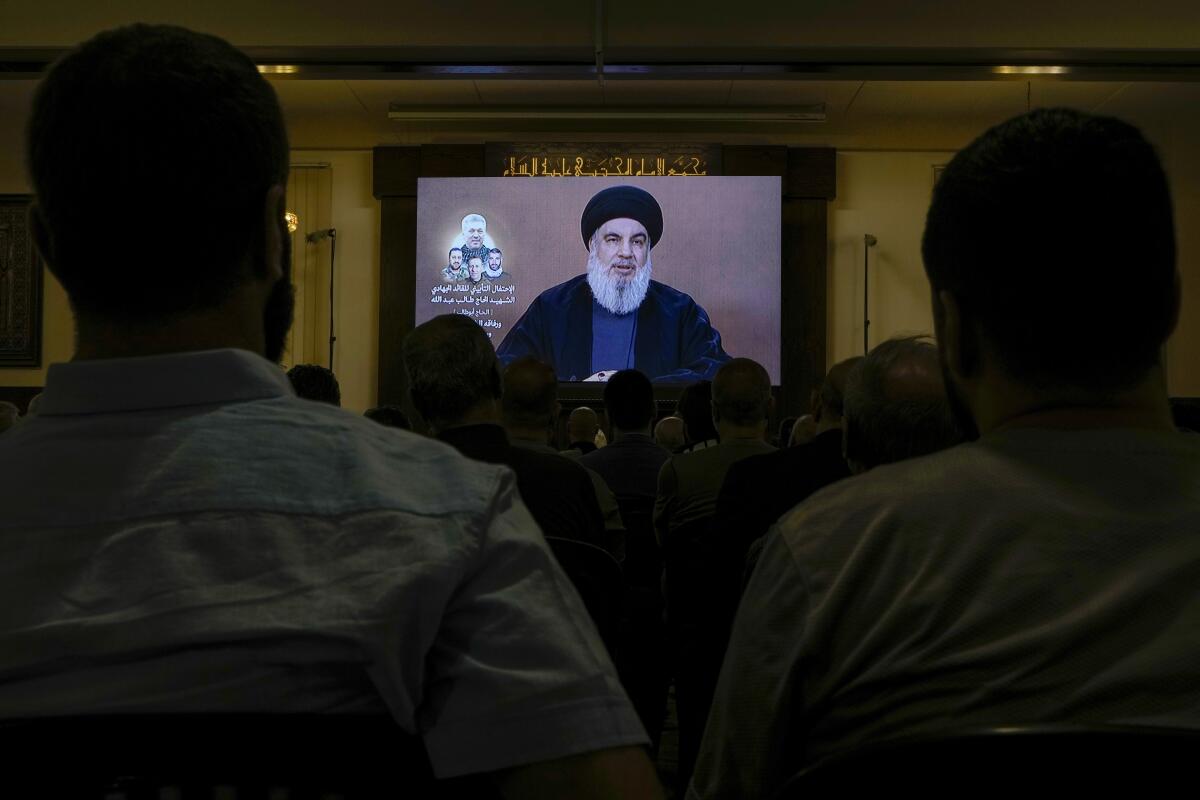
- Share via
BEIRUT — Lebanon’s Hezbollah has new weapons and intelligence capabilities that could help it target more critical positions deeper inside Israel in case of an all-out war, the militant group’s leader warned on Wednesday.
Hassan Nasrallah’s comments came as the months-long cross-border conflict simmering between Hezbollah and Israel appears to be reaching a boiling point, and a day after a top U.S. envoy met with Lebanese officials in his latest attempt to ease tensions.
“We now have new weapons. But I won’t say what they are,” Nasrallah said in a televised address commemorating a top Hezbollah commander killed in an Israeli airstrike in southern Lebanon last week. “When the decision is made, they will be seen on the front lines.”
Hezbollah used locally made explosive drones for the first time after the Israel-Hamas war in the Gaza Strip started in October, and has used surface-to-air missiles to chase off Israeli jets.
Lebanon-based Hezbollah is holding back from all-out war with Israel for now — but chances of a dangerous miscalculation by either side are high.
Nasrallah said in 2021 that Hezbollah had 100,000 fighters, but now claims, without elaborating, that the number is much higher. He also said he had rejected offers from allied countries and militias in the region that could add tens of thousands to his ranks.
A nearly 10-minute video allegedly taken by a Hezbollah surveillance drone and released Tuesday shows parts of Haifa, Israel — a city far from the border with Lebanon. In his speech Wednesday, Nasrallah said Hezbollah had much more such video — an apparent warning that the militants could reach sites deep in Israel.
Israel’s military chief, Lt. Gen. Herzi Halevi, visiting Israeli air-defense soldiers near the border with Lebanon on Wednesday, said that Israel was aware of the capabilities Hezbollah demonstrated in the video, and that it had solutions for these threats.
“We of course have infinitely greater capabilities,” he said. “I think the enemy is only familiar with a few of them, and [we] will confront them at the right time.”
Hezbollah, an ally of the Palestinian militant group Hamas, has been exchanging strikes with Israel almost daily since Oct. 7, aiming to pull Israeli forces away from the hard-hit Gaza Strip.
Hezbollah has vowed to intensify its attacks along the Lebanon-Israel border to avenge the killing of its most senior military commander by Israel since the latest round of violence began eight months ago
Hezbollah’s attacks escalated after Israel expanded its offensive into the southern Gaza city of Rafah in May, and again this month after an Israeli strike killed Taleb Sami Abdullah, the highest-ranking Hezbollah commander to have died during the current war.
The Israeli army said Tuesday it had “approved and validated” plans for an offensive in Lebanon, although the decision to actually launch such an operation would have to come from Israel’s political leaders..
The warnings by both sides followed a visit by Amos Hochstein, a senior advisor to President Biden. Hochstein met with officials in Lebanon and Israel in his latest attempt to deescalate tensions. He told reporters in Beirut on Tuesday that it was a “very serious situation” and that a diplomatic solution to prevent a larger war was urgent.
Nasrallah said a wider war between Israel and Lebanon would have regional implications and that Hezbollah would attack any country in the region if it were to assist Israel in the war. He cited Cyprus, which has hosted Israeli forces for training exercises, and suggested Cyprus might let Israel use its bases in a wider war.
Hamas resurfaces in areas where Israel withdrew most forces a month ago, deploying police and making salary payments to civil servants in Gaza City.
Cypriot President Nikos Christodoulides countered that his island nation “is in no way involved” in any military operations in the region. Cyprus is “part of the solution, not part of the problem” he said, pointing out the Cyprus-Gaza maritime corridor used to deliver aid to the Palestinian territory.
Only a cease-fire in Gaza would be expected to halt the Lebanon-Israel border fighting or the attacks on Western and Israel-linked targets by Yemen’s Houthi rebels and Iraqi militias allied with Hezbollah.
Israel views Hezbollah as its most direct threat. The two fought a 34-day war in 2006 that ended in a stalemate. Hezbollah’s military capabilities have grown significantly since then, and the U.S. and Israel estimate the group and other Lebanese militant factions have about 150,000 missiles and rockets. Hezbollah also has been working on precision-guided missiles.
Hezbollah said at least four of its fighters were killed Wednesday in Israeli strikes as Hochstein returned to Israel for more meetings.
U.S. Secretary of State Antony J. Blinken has met with the leaders of Turkey and Greece during the first stop of his latest Mideast diplomatic mission.
Lebanese state media reported strikes along the border and near the coastal city of Tyre, about 20 miles away. The Israeli military said two Hezbollah launches damaged several vehicles in northern Israel.
Kamel Mohanna, head of the Amel Assn., a nongovernmental organization providing health services in different areas of Lebanon, said its health center in the town of Khiam was hit and damaged by the Israeli shelling.
Israeli strikes have killed more than 400 people in Lebanon, most of them Hezbollah and other militants, but also more than 80 civilians and noncombatants. In northern Israel, 16 soldiers and 11 civilians have been killed by strikes launched from Lebanon.
Chehayeb and Sewell write for the Associated Press.
More to Read
Sign up for Essential California
The most important California stories and recommendations in your inbox every morning.
You may occasionally receive promotional content from the Los Angeles Times.
